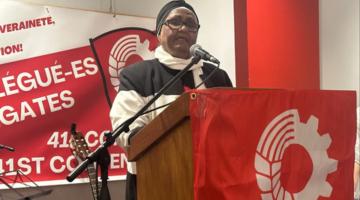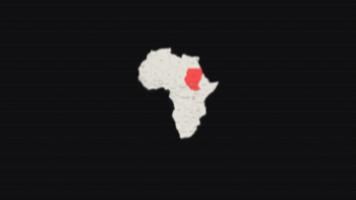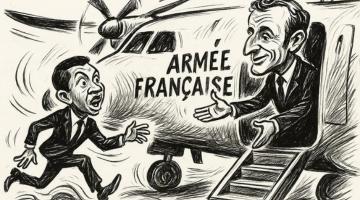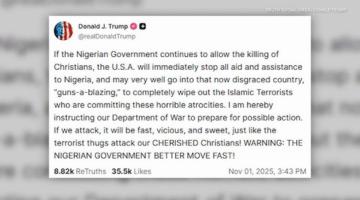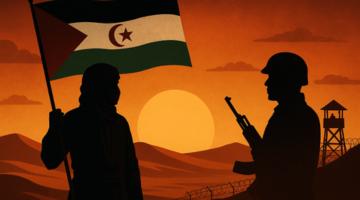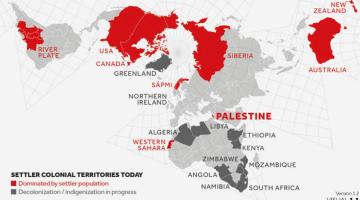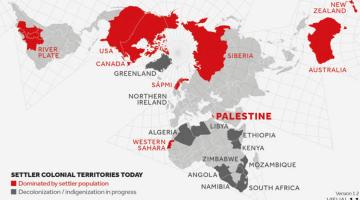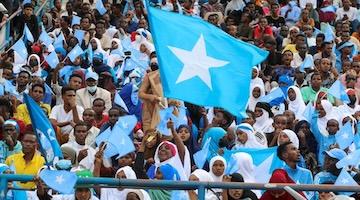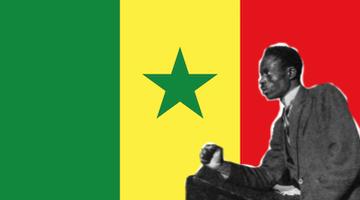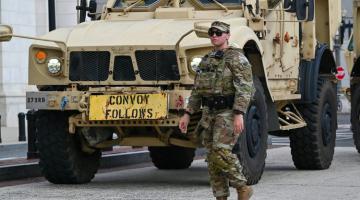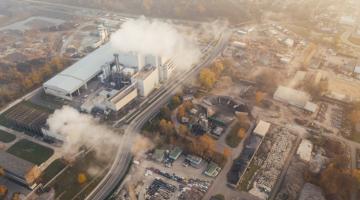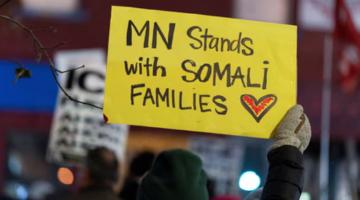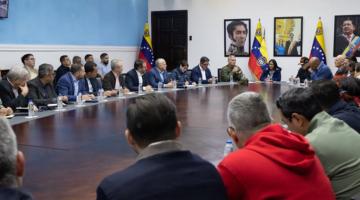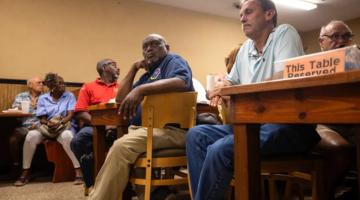“This violence of the colonial regime…irreparably provokes the birth of an internal violence in the colonized people.”
Frantz Fanon was born in Fort-de-France, Martinique on July 20, 1925. To mark the centenary of the birth of this great psychiatrist, theorist of colonial violence, and African revolutionary, we reprint his speech, “Pourquoi nous employons la violence,” translated into English as “Why we Use Violence.” Fanon delivered the speech during the International Conference on Positive Action for Peace and Security in Africa, held in Accra, Ghana from April 7th to 10th, 1960. Organized by Kwame Nkrumah’s Bureau of African Affairs, the conference was part of a broader mobilization against French nuclear imperialism in Africa. Its proceedings carried an added urgency after France performed their first nuclear tests in the Sahara on February 13, 1960. At the same time, African resistance to white settler colonial repression in South Africa and Algeria was intensifying.
Appointed by Algeria's FLN as the representative of the provisional Government of the Algerian Republic, Fanon was based in Accra during this time — a time when Ghana was a hub of African revolutionary activity. Fanon's speech at the Positive Action conference captures the urgency of the revolutionary moment, and witnesses described it as “electrifying,” and said he was almost overcome with emotion and fervor during its delivery. “Why we Use Violence” also succinctly articulates Fanon’s arguments about colonial violence expanded in The Wretched of the Earth, published soon after his tragic death from leukemia on December 6, 1961 at the age of thirty-six.
But of course, like all of Fanon’s work, “Why we Use Violence” transcends the historical moment in which it was written. It speaks prophetically to other moments of repression and resistance with a clarity, passion, and humanity that is rarely matched. And one hundred years after his birth, as the “murderous reactions” of the colonists continue unabated, Fanon’s prophetic, revolutionary genius remains undefeated. When Fanon says, “We must really make the white settlers hesitate and the nations that support them,” he could easily be giving us advice on what to do about the zionist monsters currently committing genocide in Palestine.
Why We Use Violence
Frantz Fanon
Address to the International Conference on Positive Action for Peace and Security in Africa, held in Accra, Ghana from April 7th to 10th, 1960.
I think that all the concerns that preoccupy Africa today have been tackled with mastery, with clear sightedness, in the speech of Dr Nkrumah.
Today I would like to share with you some of the reflections that have been prompted by certain passages. The problem of violence and that of the racism of African states will be questions that I would like fraternally to discuss with you.
I do not want, you may well understand, to proceed today to a critique of the colonial system. I do not intend as a colonized man, speaking to colonized people, to demonstrate that the colonial state is an abnormal, inhuman and reprehensible state. It would be grotesque on my part to want to convince you of the unacceptable nature of colonial oppression. However, I would like to focus my reflections on the violence integral to colonial oppression.
The colonial regime is a regime instituted by violence. It is always by force that the colonial regime is established. It is against the will of the people that other peoples more advanced in the techniques of destruction or numerically more powerful have prevailed.
I say that such a system established by violence can logically only be faithful to itself, and its duration in time depends on the continuation of violence.
But the violence which is in question here is not an abstract violence, it is not only a violence perceived by the spirit, it is also a violence manifested in the daily behaviour of the colonizer towards the colonized: apartheid in South Africa, forced labour in Angola, racism in Algeria. Contempt, a politics of hate, these are the manifestations of a very concrete and very painful violence.
Colonialism, however, is not satisfied by this violence against the present. The colonized people are presented ideologically as a people arrested in their evolution, impervious to reason, incapable of directing their own affairs, requiring the permanent presence of an external ruling power. The history of the colonized peoples is transformed into meaningless unrest, and as a result, one has the impression that for these people humanity began with the arrival of those brave settlers.
[What I say here is of capital importance for the history of errors that can confuse human reason.]
Violence in everyday behaviour, violence against the past that is emptied of all substance, violence against the future, for the colonial regime presents itself as necessarily eternal. We see, therefore, that the colonized people, caught in a web of a three-dimensional violence, a meeting point of multiple, diverse, repeated, cumulative violences, are soon logically confronted by the problem of ending the colonial regime by any means necessary.
This violence of the colonial regime is not just lived on the level of the soul, but also that of the muscles, of the blood. This violence that wills itself to be violent, which becomes more and more boundless, irreparably provokes the birth of an internal violence in the colonized people and a just anger is born that seeks to express itself.
The role of the political party that takes the destinies of this people into its hands is to curtail this violence and to channel it by providing it with a peaceful platform and a constructive basis, since for the human spirit which contemplates the unfolding of history and which tries to stay on the ground of the universal, violence must first be fought with the language of truth and of reason.
But it happens, alas – and there cannot be anyone who does not deplore this historical necessity – it happens, I say, that in certain enslaved regions the violence of the colonized becomes quite simply a manifestation of his strictly animal existence. I say animal and I speak as a biologist, for such reactions are, after all, only defensive reactions reflecting a quite banal instinct of self- preservation.
And the achievement of the Algerian revolution is precisely to have culminated in a grandiose way and to have caused a mutation of the instinct of self-preservation into value and truth. For the Algerian people, the only solution was this heroic struggle at the heart of which they had to crystallize their national consciousness and deepen their attribute as an African people.
And no one can deny that all this blood spilt in Algeria will definitely serve as leaven to the great African nation.
In certain colonies, the violence of the colonized is the last gesture of the hunted man, meaning that he is ready to defend his life. There are colonies which fight for freedom, independence, for the right to happiness. In 1954, the Algerian people took up arms because at that point the colonial prison became so oppressive that it was no longer tolerable, because the hunt was definitely on for Algerians in the streets and in the countryside and because, finally, it was no longer a question for the Algerian of giving a meaning to his life but rather of giving one to his death.
[We have found out from the press and from the radio that a European was recently sentenced to death in Kenya for having killed an African. Well, in Algeria such a thing is impossible. On the contrary, I think they would congratulate a European who did something like that and they would give him a medal for pacification.]
The million Europeans living in Algeria pose particular problems. The colonists in Algeria are afraid of the Algerian nation. Physical fear, moral fear. And this double fear translates into aggressivity and severely homicidal conduct. At the base of this behaviour we find: 1) a very powerful guilt complex. ‘If the Algerians’ they say ‘should one day rule Algeria, they would certainly do what we colonists have done, and make us pay for our crimes’; 2) there is also a certain Manichaean conception of humanity which would always divide it into oppressors and oppressed.
[And here I tackle the second point of my speech, which refers to racism in Africa.]
We Africans are not racist and the Honourable Dr Nkrumah is right when he says: “The concept of Africa for the Africans does not mean that other races are excluded. It only means that Africans who are naturally the majority in Africa should govern themselves in their own countries. We struggle for the future of humanity and it is a most important struggle.”
The colonist in Algeria says that Algeria belongs to him. We, Algerians, we say: “We agree, Algeria belongs to all of us, let us build it on democratic bases and together build an Algeria that is commensurate with our ambition and our love.”
The colonists reply to us that they do not want a changed Algeria. What they want is an Algeria that perpetuates its current state eternally. In reality, the French settler does not live in Algeria, he reigns there and each tentative attempt to change the colonial statutes provokes extremely murderous reactions from the colonist.
Fourteen days ago our brothers in South Africa expressed their hostility to the laws promulgated by the Union’s racist government. 200 deaths were reported. We cry for our South African brothers, criticize the South African government, condemn the South African government and we say that this international moral pressure is a major asset in the struggle for African freedom.
But on 8 May 1945, almost fifteen years ago, the Algerian people marched in the main cities of Algeria to demand the release of certain political detainees and the application of human rights on the national territory. At the end of the day, 45,000 dead Algerians were buried. These figures, which revolt any conscience, are the figures recognized by the government of the French Republic. Until now, not one Frenchman has been brought to justice to answer for any one of those 45,000 dead.
What we are saying is that we need to close our ranks. It is necessary that our voice should be powerful not only by being vigorous but also for the concrete measures that could be taken against this or that colonial state.
African comrades, may the day never dawn where we can still see in 24 hours 45,000 African citizens swept away by colonial barbarism!
We must really make the white settlers hesitate and the nations that support them.
In Angola, where 200,000 Portuguese rule by terror. In Rhodesia, where the monstrous face of racism shows itself with unparalleled violence. In Kenya, where our valiant brother Jomo Kenyatta rots in prison and where the settlers do not despair of fighting a final and victorious battle.
The settler such as one finds in Algeria, in Angola, in Kenya, in Rhodesia and in the Union of South Africa is obstinately hostile to any attack on his supremacy.
We do not say to the settler “You are a stranger, go away.” We do not say to him: “We will take over the leadership of the country and make you pay for your crimes and those of your ancestors.” We do not tell him that “to the past hatred of the Black we will oppose the present and future hatred of the white man.” We say to him: “We are Algerians, banish all racism from our land, all forms of oppression and let us work for man, for the flourishing of man and for the enrichment of humanity.”
The settler replies, and the French government supports him: “Algeria is French.” In Angola: Angola is Portuguese. In the Union of South Africa: The Union of South Africa is a white state.
To the declaration of the Algerian Prime Minister, Ferhat Abbas, in which he solemnly appealed to the Europeans of Algeria as Algerian citizens – a declaration whose soaring thoughts and moving terms has made an impact on the most pro-French Western countries – General de Gaulle responded, under the pressure of the settlers and the army, that it was necessary to destroy any idea of an Algerian nation. Rather than recognize Algerian national sovereignty, the French government preferred to change its government six times and once its constitution. And the fifth Republic set up by General de Gaulle experiences, despite the atomic bombs set off in the Algerian Sahara, more and more difficult moments as a result of the prolongation of the war in Algeria.
In our military hospitals of the resistance, the Algerian wounded taken prisoner by the French, are often cowardly, savagely slaughtered in their beds. We treat tortured Algerians. We take care of Algerian women who have become mad after rapes and torture. And we bury by the dozens Algerians shot in the back. And the valiant Yugoslav people are welcoming at an accelerated rate Algerian amputees, dismembered, blinded, and I say that if anger does not overwhelm whoever witnesses such things, it is because he lacks a dimension.
Besides, it should be pointed out that it is first of all this anger, this immense repulsion for the French atrocities which have directed towards our ranks the greater part of Europeans in Algeria who are members of the FLN [Front de libération nationale–National Liberation Front] today. Sometimes it is the own children of policemen who have been obsessed by the cries of the tortured during the night. And you now understand why some Christians, some priests are also active within the FLN. Why today there are Europeans from Algeria, descendants of settlers, who die under the French bullets in the ranks of the valiant National Liberation Army of Algeria.
[The fact is that behind this anger, by coming into contact with the extraordinarily exhilarating message of the Algerian revolution, Europeans have discovered their love for their Algerian homeland and refined their national spirit.]
No, the violence of the Algerian people is neither a hatred of peace nor a rejection of human relations, nor a conviction that only war can put an end to the colonial regime in Algeria.
The Algerian people have chosen the unique solution that was left to them and this choice will hold firm for us.
General de Gaulle said: ‘We must break the Algerian people.’ We reply: ‘Let us negotiate, find a solution that is commensurate with contemporary history. But know that if you want to break the Algerian people, you will have to accept seeing your armies break themselves against the rampart of the glorious Algerian soldiers.’
So many Africans have died to defend the sovereignty of European states that it is worth it today when Africans agree to die for the freedom of Africa. And my presence here in Ghana as official representative of the GPRA [Gouvernement provisoire de la République Algérienne –the provisional Government of the Algerian Republic established by the FLN in 1958], the Algerian flag flying over Accra, proves that the Government and the people of Ghana support the Algerian people, found an unconditional hope on their victory and bear a warm and fraternal esteem towards the glorious soldiers of the Algerian army.
My presence here witnesses that Algeria is amongst you, that you make her sufferings and her hopes your own and that in a very precise way a great leap forward has been taken on the path of unity and African greatness.
Frantz Fanon, “Why we use violence,” translation of ‘Pourquoi nous employons la violence’ (discours prononcé à la Conférence d’Accra, avril 1960), from L’An V de la révolution algérienne, in Œuvres, Paris: La Découverte, 2011, pp. 413–18.

